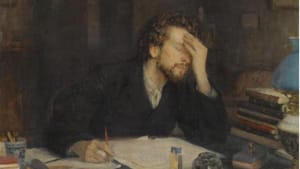Stay in the Loop
BSR publishes on a weekly schedule, with an email newsletter every Wednesday and Thursday morning. There’s no paywall, and subscribing is always free.
Pondering the life of creation

Benjamin Britten applied for conscientious objector status during WWII by arguing that he had devoted his life to creation and couldn’t switch to destruction. When I reviewed a Britten program last November, I found myself writing that Britten had lived “a life of creation, not action.” It occurred to me that was the first time I had typed the phrase “life of creation.”
There are a number of possible “lives of.” Many groups define themselves with some version of the concept. Certain religious orders practice a life of contemplation. Soldiers and people who take up the helping professions may talk of a life of duty or a life of service. The life of sacrifice and the life of adventure have received their share of attention along with less strenuous possibilities, such as the life of leisure, or grimmer alternatives like Thoreau’s life of quiet desperation.
But the life of creation? That seems to be an unexplored topic, even though it’s a basic description of a life in the arts. How does a life of creation differ from other kinds of lives?
I’m still pondering the idea, but I think I understand the difference between a life of creation and a life of action. Creative people don’t try to change the world. They enlarge it. They add new things to it.
That is the major difference, I think, between a life devoted to creation and a life devoted to the political activity that preoccupies the news industry. Politicians and political activists spend their lives trying to alter the world, and their efforts usually require some degree of coercion. Even in democracies, where you can get your way by persuading a majority, some members of the minority only submit to the “will of the people” because they’re forced to.
It just is
Creative people don’t engage in coercion, and they usually don’t spend much time hectoring the public with attempts at persuasion. They frequently exhibit a pronounced aversion to marketing and self-promotion. Sometimes people pay attention to their creations, and some of those people are influenced by those creations, for good or ill. Sometimes their work just sits there without an audience. Either way, the thing itself exists.
I think it’s important to remember that the word “creative” has two meanings. In the narrowest sense, it refers to the kind of imaginative, inventive originality we demand from the arts. In the broadest sense, it simply means you’re making something. The architect who designs a building is being creative in the artistic sense. The workers who erect the building are being creative in the larger sense. The developer who initiated the project is being creative in both senses, starting with the vision to perceive a commercially successful building can be constructed on a particular site and following through with the more down-to-earth skills of a good organizer.
Hybrid creative types like the developer are a major force in the modern world. Who has had the biggest influence on our lives? The politicians who have temporarily occupied the White House? Or individuals like Henry Ford, the Wright Brothers, Thomas Edison, Steve Jobs, Bill Gates, and all the anonymous engineers and technicians who’ve worked with them?
The hybrid types are just as important in the arts, where they create institutions like the Philadelphia Orchestra, the Philadelphia Chamber Music Society, and all the smaller (but equally important) organizations that pack big city Arts and Entertainment calendars.
A continuous enlargement
Do you think the world would be a better place if more people listened to Bach? You could spend your life trying to persuade people they should expand their musical tastes in the hope that someday a majority will vote for a mammoth, tax-supported, national Bach program. Or you could do what the people who organize the Philadelphia Bach Festival do and create a Bach program yourself.
If you choose the second option, you don’t need a majority. You just need enough support. Your supporters may constitute an insignificant voting bloc to the politicians, but creative people can work with less restrictive arithmetic.
The life of creation may look like a withdrawal, but the people who choose it are the source of a continuous enlargement of human society. The effects of the creative personality include everything that makes the modern world distinctive, from the abundance on display at Macy’s and CVS to the thousands of titles on sale in a large bookstore; the revolutionary techniques in daily use in our hospitals; and all the musical and theatrical events that keep us complaining that we can’t take in one event without missing two others that are taking place at the same time.
Sign up for our newsletter
All of the week's new articles, all in one place. Sign up for the free weekly BSR newsletters, and don't miss a conversation.
 Tom Purdom
Tom Purdom